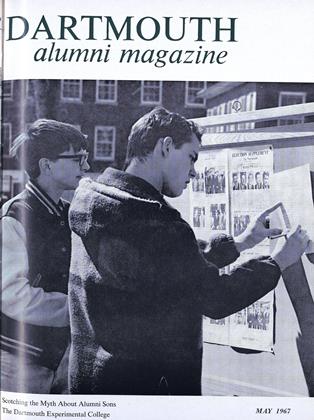"This is the age of the homeless man," according to EDWARD B. MARKS '32 who speaks from over 25 years' experience with refugees.
Marks recently returned from a ten-month assignment in Vietnam and is now AID (Agency for International Development) Coordination Officer at the American Embassy in London. In addition to representing the Peace Corps and being liaison to various British agencies working in Vietnam, he works with British authorities concerned with aid to India, Pakistan, the Middle East, the Caribbean, and the many countries of Africa where the U.S. and the U.K. have a common interest.
"Ed of AID," as he has been called since 1962, is an optimist who has confidence that burgeoning countries will find their way to peace and stability if we help them to help themselves.
"The most gratifying part of refugee work," he says, "is helping those who have fled to reestablish themselves. Fortunately, this has been a part of every job I have done with refugees."
After earning an M.A. in sociology at Columbia he spent a few years in publishing, as an editor of a wine journal and of Better Times, a news weekly of New York's council of social agencies. Since 1942, his work with the homeless has been under the auspices of various agencies: the International Refugee Organization in Geneva and Athens; the Intergovernmental Committee for European Migration in Athens, Belgrade, New York; the U.S. Committee for Refugees in New York, of which he was the first executive director and continues as a board member.
His first refugee job, aiding those who entered the U.S. from Nazi-dominated countries prior to World War II, he describes as relatively easy. Speeding the resettlement of the Japanese-Americans (of whom two-thirds were American born), banished from the West Coast and herded into detention camps, was full of challenge, he says. "But it had its reward in the way this minority group surmounted the twin barriers of racial prejudice and jingo patriotism."
He worked in postwar Europe with displaced persons and new refugees from Eastern Europe, aiding them in emigrating to Australia, Canada, Latin America, the United States, and other countries. This culminated in quick action to find placement for the Hungarian refugees who streamed across the borders of Austria and Yugoslavia in late 1956 and early 1957.
Last year in Vietnam his duties were to "help the Vietnamese do the job." He says: "We had to put the main stress on meeting the most essential creature comforts. But before I left, we had the satisfaction of taking that second step - helping refugee families leave their temporary shelters for other areas where they could make a new start in farming or other work contributing to the nation's wartime economy."
When time permits, he does outside writing and has appeared in The New Yorker and Playboy. In a February article in The Reporter he wrote of his Vietnam experiences, observing that the refugee has been a constant in Vietnam's recent history and in the past three years ten per cent of the population have been displaced. But he concludes that some good might come from their situation: urbanization is increasing, previous respect only for village law may give way to a new respect for a central authority, and perhaps a badly needed sense of nationhood will develop in South Vietnam.
Marks is critical of the previous restrictive quota provision of our McCarran-Walter immigration law. "Thank heaven," he says, "this anachronism was repealed in late 1965, and in its stead we have an immigration measure that no longer discriminates on the basis of national origin.
"I have always been a booster for U.S. immigration. The infusion of new blood and talents throughout our history has been one of our most powerful influences — it has kept us young and vital."
 View Full Issue
View Full Issue
More From This Issue
-
 Feature
FeatureScotching the Myth About Alumni Sons
May 1967 By RAYMOND SOBEL, M.D. -
 Feature
FeatureThe Humanistic Pursuit of Values
May 1967 By ROBIN J. SCROGGS -
 Feature
FeatureThe Dartmouth Experimental College
May 1967 By ROBERT B. REICH '68 -
 Feature
FeatureManhattan Realtor
May 1967 -
 Feature
FeatureBotanic Director
May 1967 -
 Feature
FeatureBridge Master
May 1967
Features
-
 Cover Story
Cover StoryBLACK BALL BOX
MARCH | APRIL 2014 -
 Feature
FeatureCOD and MAN at Dartmouth
SEPTEMBER 1998 By David Dobbs -
 Feature
FeatureTHE HOPKINS CENTER
MAY 1957 By JOHN R. SCOTFORD JR. '38 -
 Feature
FeatureTerrorism and the Niceties of Justice
MAY 1982 By Joseph W. Bishop Jr. -
 Feature
FeatureONCE UPON A CRIME
FEBRUARY 1994 By Lawrence Treat '24 -
 Feature
FeatureAmerica's First Hostage Negotiator
DECEMBER 1981 By Peter Bridges

